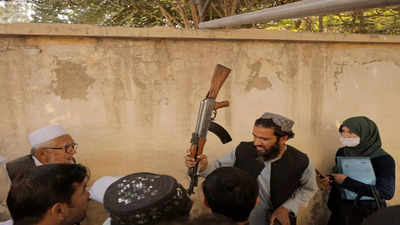- News
- World News
- US News
- White House gets more time to assess billions in frozen Afghan funds
Trending
This story is from January 29, 2022
White House gets more time to assess billions in frozen Afghan funds

NEW YORK: A United States judge on Friday gave the Biden administration more time to decide what should be done with about $7 billion of frozen Afghan central bank funds, which some victims of the September 11, 2001, attacks want and which the Taliban claims is theirs.
Magistrate Judge Sarah Netburn in Manhattan gave the Department of Justice until Feb. 11 to recommend what to do with the funds, which are held at the Federal Reserve Bank in New York.
The funds have been frozen since the Taliban's military takeover in Afghanistan last August. A recommendation on what to do had been expected by Friday.
In a Thursday court filing, the Justice Department requested more time to address the "many complex and important issues" including Sept. 11 victims' claims, diplomacy, and the "still-evolving" situation in Afghanistan.
Some 9/11 victims and their families are seeking to cover unsatisfied court judgments related to the attacks, which killed nearly 3,000 people.
One group, the Havlish plaintiffs, won court permission in September to serve the New York Fed a so-called writ of execution to seize the $7 billion and cover an October 2012 court judgment of about the same amount.
The White House also faces pressure from the United Nations and humanitarian aid groups not to apply the funds toward court judgments. They would prefer money be used to shore up Afghanistan's central bank, ease the country's liquidity shortfalls, and help address poverty, hunger and other economic distress.
Several governments, including China, Iran, Pakistan and Russia, are also urging the release of frozen Afghan assets.
United Nations Secretary-General Antonio Guterres has called for a mechanism to free up about $9.5 billion in Afghan reserves frozen worldwide, including in the United States.
The US sanctions ban doing financial business with the Taliban. Humanitarian support for the Afghan people is allowed.
Magistrate Judge Sarah Netburn in Manhattan gave the Department of Justice until Feb. 11 to recommend what to do with the funds, which are held at the Federal Reserve Bank in New York.
The funds have been frozen since the Taliban's military takeover in Afghanistan last August. A recommendation on what to do had been expected by Friday.
In a Thursday court filing, the Justice Department requested more time to address the "many complex and important issues" including Sept. 11 victims' claims, diplomacy, and the "still-evolving" situation in Afghanistan.
It said the matters are being fully discussed and "receiving urgent attention at the highest levels of government".
Some 9/11 victims and their families are seeking to cover unsatisfied court judgments related to the attacks, which killed nearly 3,000 people.
One group, the Havlish plaintiffs, won court permission in September to serve the New York Fed a so-called writ of execution to seize the $7 billion and cover an October 2012 court judgment of about the same amount.
The White House also faces pressure from the United Nations and humanitarian aid groups not to apply the funds toward court judgments. They would prefer money be used to shore up Afghanistan's central bank, ease the country's liquidity shortfalls, and help address poverty, hunger and other economic distress.
Several governments, including China, Iran, Pakistan and Russia, are also urging the release of frozen Afghan assets.
United Nations Secretary-General Antonio Guterres has called for a mechanism to free up about $9.5 billion in Afghan reserves frozen worldwide, including in the United States.
The US sanctions ban doing financial business with the Taliban. Humanitarian support for the Afghan people is allowed.
End of Article
FOLLOW US ON SOCIAL MEDIA










